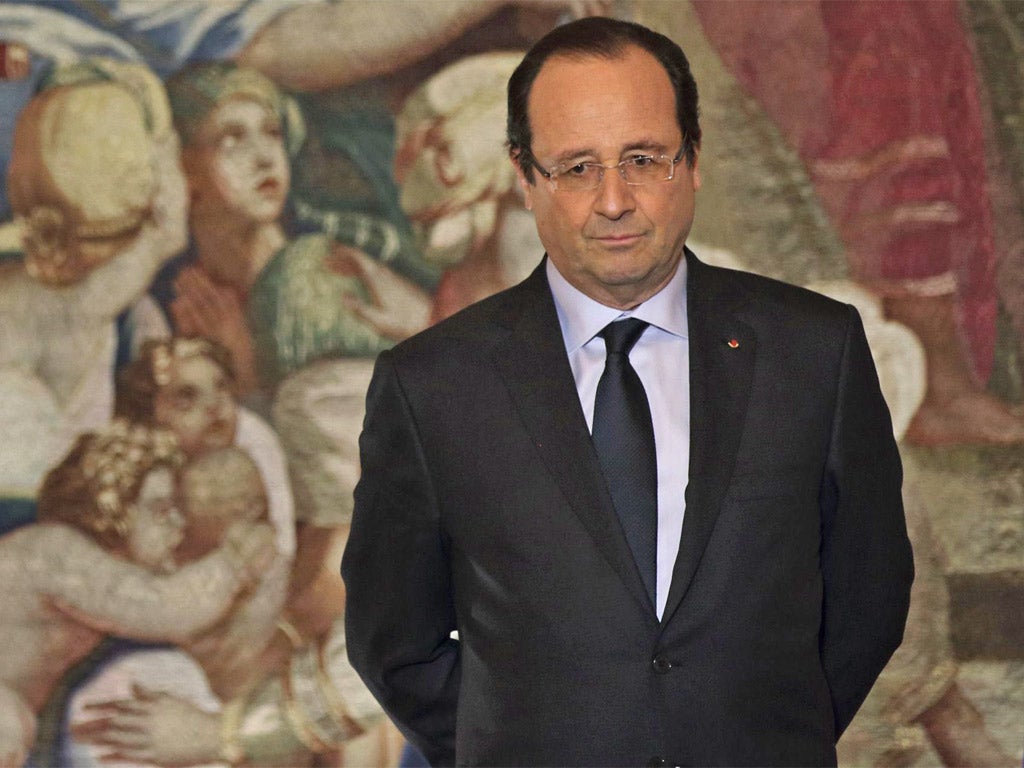'Tightrope walker' and 'trapeze artist': François Hollande is a wimp at home and a warrior in Africa
The French President has been criticised for his interventions in Mali and CAR but insists it is not old-fashioned paternalism but a mission to save lives

In the half century since France began to free its former African colonies, French troops have intervened on the continent an average of once a year.
President François Hollande came to power in 2012 declaring that this old paternalistic and self-interested policy, known as “Françafrique”, was dead. He would change the pattern.
In power, he has both broken and kept his word. In the past year, he has sent French troops to intervene in African internal conflicts not once but twice: against Islamist rebels in Mali in January and to prise apart the Muslim and Christian communities in the Central African Republic this month.
In between, President Hollande was the only Western leader to commit himself, on his own personal authority, to “punish” Syria’s Assad regime for the gas attack near Damascus on 21 August. France stood tough last month against Iran – and against the US and its EU partners – in the negotiations which led to an interim deal on Iranian nuclear policy.
Hollande has proved to be both wimp and warrior: a frustratingly minimalist domestic reformer but a bold, global statesman. Le Monde describes him as a “tightrope walker” at home and a “trapeze artist” abroad.
To an extent, one Hollande explains the other. At home, the President is obliged to be cautious by the unreconstructed leftism of much of his own Socialist party and by France’s own schizophrenic tendency to demand “change” but to oppose all changes.
Abroad, Hollande can be decisive. The French constitution gives the President substantial, independent powers over foreign and defence issues. France remains one of only three military powers in the West and the only, significant, external, military power in Africa.
When a political-military crisis occurs in Mali or a military-humanitarian crisis in the Central African Republic (CAR), a French president is obliged to make a decision one way or another. Intervention is a momentous choice but so is non-intervention.
In Mali, Hollande insisted that the broadly successful French campaign should not be compared to the old “Françafrique” policy of fomenting or reversing military coups to defend French national interests. France was fighting an international war against Islamist terrorism, he said.
In Central Africa, Mr Hollande says that he is neither intervening on the side of the Christians (80 per cent of the population) nor of the Muslims. He is neither propping up the Muslim president nor trying to install a “Christian” government. He is trying to prevent a civil war and to ease a humanitarian crisis in which a million people – a quarter of the population of CAR – are threatened with starvation.
“Many people are asking what we are doing there,” he said at the weekend. “Well, it’s our role. We have a history. We have values. There have been many French military interventions in Central Africa in the past 30 or 40 years. They were always to defend dictators or to depose them. I prefer to act to defend peoples.”
Critics of Mr Hollande’s, and France’s, policy in Africa, say that this is merely the old paternalist interventionism under another name. So long as French troops are based in Africa, former French colonies will never shake off the bad habit of needing France to interfere in their politics or their wars. It would be unthinkable, they say, for Britain to intervene in Zimbabwe or Kenya.
On the other hand, the CAR was threatening to tip into something close to genocide before the French intervention. The African Union has proved largely ineffectual so far. So has the United Nations.
François Hollande has bad memories of 1994. France was caught, politically, on the wrong side of the assault by the Hutu community on the Tutsis in Rwanda. He was an adviser to President François Mitterrand at the time.
The intervention in CAR may fit the age-old pattern of French interference in Africa but Hollande decided that he had little choice.”
Subscribe to Independent Premium to bookmark this article
Want to bookmark your favourite articles and stories to read or reference later? Start your Independent Premium subscription today.

Join our commenting forum
Join thought-provoking conversations, follow other Independent readers and see their replies